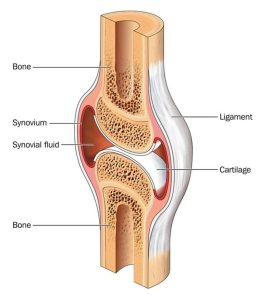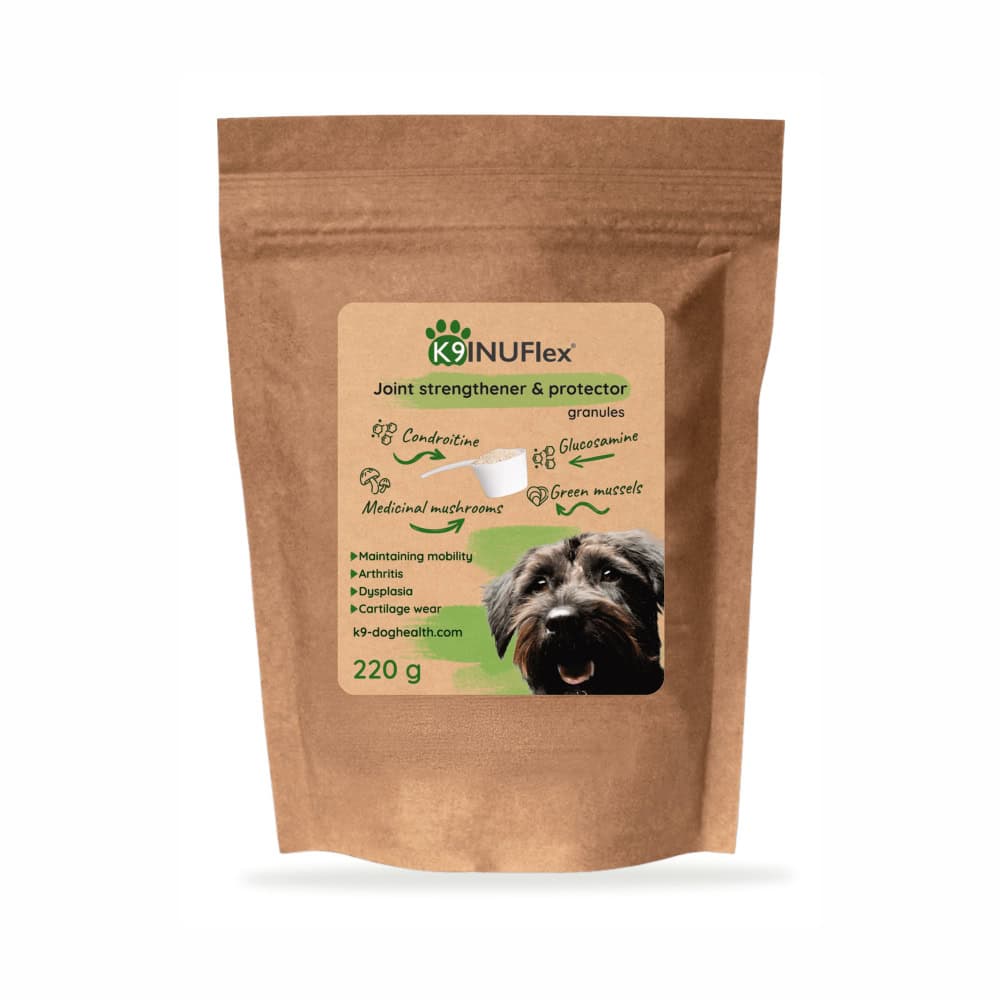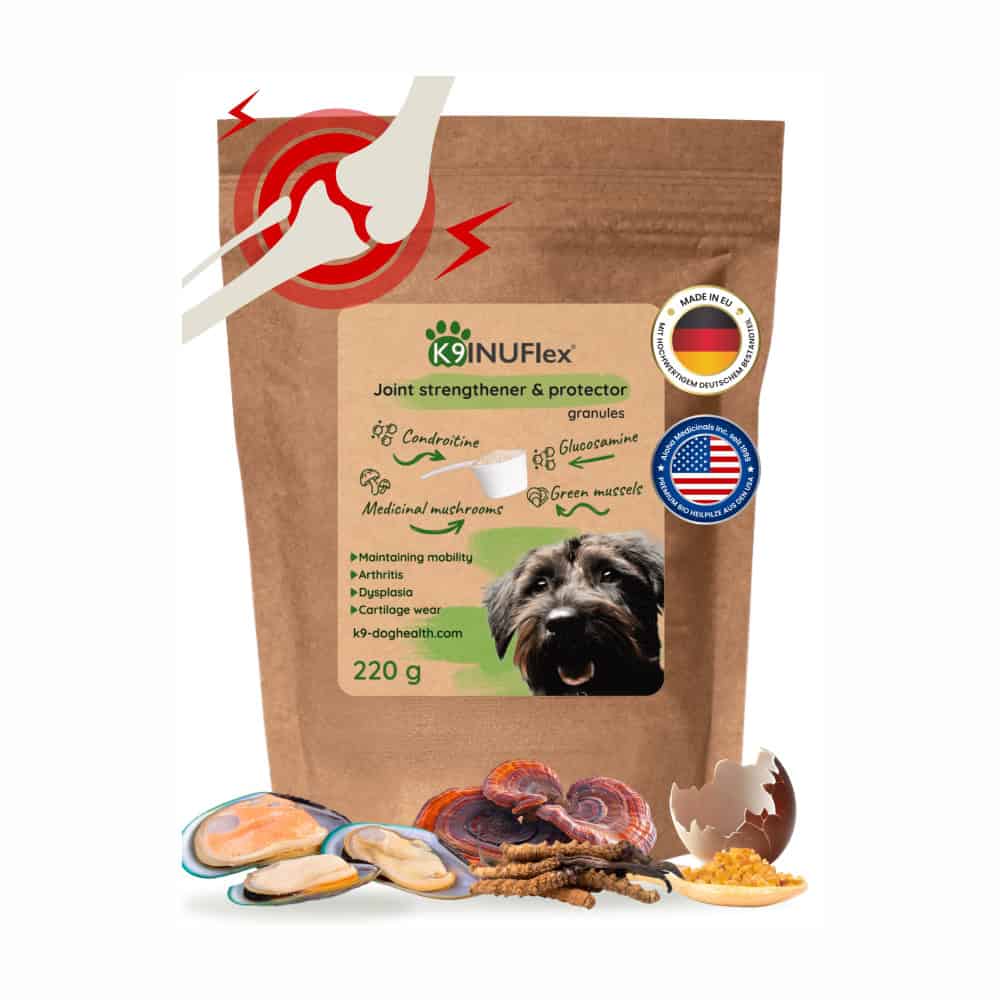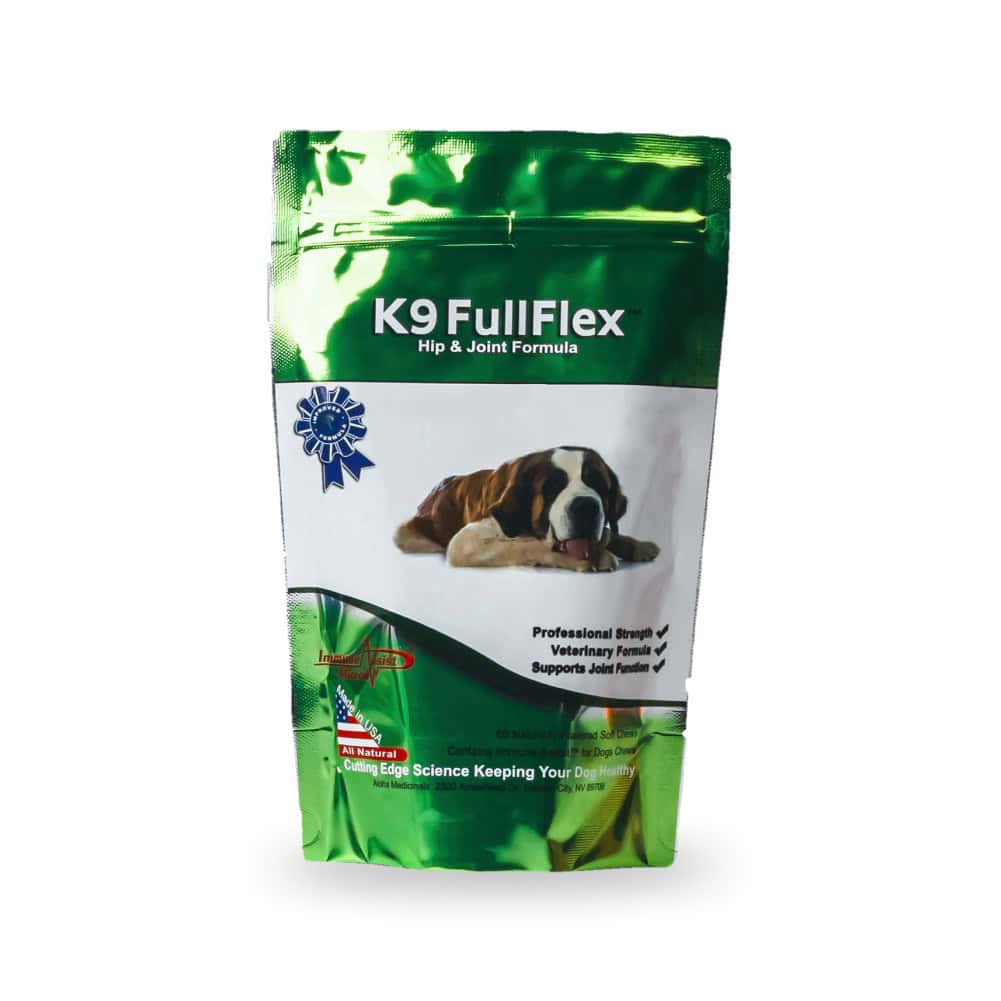Joint support for dogs is essential for maintaining mobility and quality of life. Joint problems such as hip dysplasia, arthritis, and other degenerative diseases can cause severe pain and limit your dog’s daily activities. Proper joint care and cartilage support help prevent these issues, keeping your pet active, happy, and pain-free for many years.
Early joint care helps prevent pain before it starts.
The structure of joints – the basics of joint support for dogs

Connecting bones: The bones form the structural framework of the joint. Their natural shape determines the joint’s integrity and stability.
Articular cartilage: The cartilage cushions physical impact during standing, running, and jumping. This firm connective tissue lies between the bones. When healthy cartilage becomes damaged or worn, bones rub together, causing inflammation and pain.
Synovium and synovial fluid: The lubrication between cartilage and bone allows for smooth movement. Without adequate synovial fluid, cartilage becomes exposed to friction and wear, increasing the risk of arthritis.
Ligaments: These fibrous bands connect bones and prevent dislocation. They provide the joint with its essential stability.
Why joint support for dogs is important and how it protects their joints
Joints allow dogs (and humans) to move freely in the world. Without them, our skeletons would either lack structure or become completely rigid. Without cushioning between bones, every jump, run, or change of position would cause bone impact and skeletal damage.
Joint pain, arthritis, and bone degradation are common in older dogs because as they age, the synovium produces less lubricant. Once cartilage is damaged, joint recovery becomes difficult, reducing mobility. This is why maintaining joint health and regular joint support for dogs, especially in older age, is essential.
Developmental or degenerative joint diseases – why joint protection in dogs matters
Joint diseases are typically divided into two categories: developmental and degenerative. Developmental disorders result from over- or underdeveloped joint structures. For instance, hip joints that are too large can cause bone rubbing, leading to hip dysplasia over time.
Degenerative joint diseases (osteoarthritis and osteoarthrosis) are chronic conditions characterized by pain and stiffness. They involve the breakdown of cartilage and the bone underneath, often accompanied by inflammation. This typically develops when the synovium no longer produces enough synovial fluid.
Common symptoms of joint problems in dogs
Because of persistent pain, dogs find it difficult to hide signs of arthritis. Even a moderately attentive owner will notice the symptoms of joint disease.
Movement-related changes that indicate joint problems

- Using only the front legs when standing: Hip dysplasia, one of the most common forms of arthritis, can be recognized when older dogs rely only on their front legs to rise.
- Reluctance to jump or climb stairs: Jumping and climbing are stressful for joints. If your dog hesitates or refuses to go upstairs, this may indicate joint pain.
- Swollen joints: Joint inflammation often causes visible swelling. Detecting it early can prevent further damage.
Behavioral and physical changes
- Muscle loss: Dogs may shift weight to other limbs to avoid pain, leading to muscle atrophy around the affected joint.
- Licking the affected joint: Dogs often lick painful joints to soothe discomfort.
- Behavioral changes: Your cheerful companion may become irritable or withdrawn due to chronic pain.
- Depression or lethargy: Joint pain can take away the joy of play and movement, causing depression in dogs.
Diagnosing joint problems in dogs – when is joint support necessary?
Veterinarians use various tests to identify joint problems and their underlying causes.
Physical examination
By stretching and bending muscle groups, vets can determine which joint is affected and to what extent.
Joint biopsy
By analyzing a sample taken from the joint, veterinarians can determine whether infection is causing the problem. If so, it can often be treated with antibiotics.
Blood tests
It’s essential to identify whether joint deterioration is due to autoimmune disease. In such cases, the immune system attacks healthy cells, mistaking cartilage or synovial fluid for pathogens. Treatment may require a combination of steroids and immunosuppressants.
Medical and surgical treatments – the role of joint support for dogs
Whenever possible, medical treatment is preferred over surgery. Every surgery carries risks, and there’s no guarantee it will cure the disease rather than simply relieve symptoms. Medical therapy, however, can offer dogs a normal life through anti-inflammatories, pain relievers, and medications that promote joint regeneration.
Surgery is often necessary in severe cases where the dog can no longer walk. In such cases, the surgeon attempts to clean and rebuild the affected joint. As mentioned, surgery rarely addresses the root cause, but it can make the dog responsive to further treatment.
Natural joint support for dogs – improving joint health
Several strategies can help improve joint health in dogs. Some focus on reducing pressure on the joints, while others strengthen surrounding muscles to increase flexibility and support. Combining both is the best approach. Natural joint support for dogs remains one of the most effective preventive measures. Ingredients such as green-lipped mussel extract provide long-term, safe support for joint regeneration and mobility.
Reducing stress and pressure on the joints
Maintain a healthy weight: Obesity and excess weight put enormous stress on joints. Extra weight isn’t compensated by more cartilage or synovial fluid, which means bones move closer together, increasing friction. Providing your dog with a balanced diet and keeping them at an ideal weight helps minimize joint strain.
Improve their diet: A healthy diet leads to a balanced gut microbiome, which positively affects everything from mood to heart and joint health. Combining high-quality ingredients with the right supplements is a great way to enhance your dog’s quality of life and strengthen their joints.
Low-impact exercise: If your dog has been diagnosed with arthritis, games like fetch may no longer be suitable. High-impact activities such as running, jumping, or tug-of-war can destabilize the joints and cause further damage. Instead, low-impact exercises help gently strengthen the muscles and joints while still tiring your dog in a safe way.
Walking: Who doesn’t love a good walk? It’s low-impact, clears the mind (for both you and your dog), and is a great way to unwind at the end of the day. Making walks part of your daily routine is an excellent way to keep your dog happy and healthy.

Active leisure
Indoor games: Since most outdoor games involve high-impact running, try switching to indoor activities. Nose work, for example, is excellent mental and physical exercise – teach your dog to find their toy using scent.
Teaching tricks: Dogs crave mental stimulation. Teaching new tricks and words expands their vocabulary and strengthens your bond. Studies show that some dogs can learn up to 250 words, each representing a specific command.
Hiking: Essentially a longer walk, hiking adds variety and new scents to your dog’s routine. Exploring new trails can work wonders for their mental health and strengthen their muscles in a natural, enjoyable way.
Targeting the muscles around the joints
Encourage stretching: When your dog is relaxed and lying down, gently help them perform stretches. A physiotherapist can show you which exercises are best for specific joints. Keep treats on hand – that way, your dog will enjoy the process and cooperate more easily.
Strengthening exercises: While you can’t train a joint directly, you can strengthen the muscles surrounding it. This allows the muscles to absorb some of the stress that would otherwise affect the joint.
Joint support for dogs and the best natural supplements
Most joint supplements focus only on lubrication because they can’t regenerate cartilage. While lubrication is essential, it’s equally important to choose a supplement that supports new cartilage growth. Our joint support formulas, such as K9 INUFlex® and K9 FullFlex™, offer effective help for existing joint diseases and play a major role in prevention.
Essential nutrients for canine joint health
ESM (Eggshell Membrane Protein)
Hydrolyzed eggshell membrane protein, also known as ESM (Eggshell Membrane), provides several benefits for joint and cartilage health. It contains bioactive compounds that contribute to maintaining joint integrity and cartilage resilience. Here’s how ESM supports healthy cartilage:
- Anti-inflammatory effect: ESM has natural anti-inflammatory properties that help reduce swelling and pain in joints. As a result, lowering inflammation is crucial for protecting cartilage and easing discomfort.
- Supports collagen production: ESM is rich in collagen, which plays a vital role in maintaining cartilage strength and flexibility. Therefore, it helps reduce the risk of cartilage injury and degeneration.
- Regenerative properties: The bioactive proteins and compounds in ESM promote cartilage regeneration, especially when combined with a balanced diet. This is particularly valuable for senior dogs or those recovering from joint injuries.
- Cartilage protection: ESM helps protect cartilage from wear and damage. In addition, its antioxidant properties reduce oxidative stress, which otherwise contributes to cartilage breakdown.
- Stimulates synovial fluid production: ESM supports the production of synovial fluid, which is essential for joint lubrication and protection. Consequently, proper lubrication minimizes friction and promotes smooth movement.
- Highly bioavailable: Hydrolyzed eggshell membrane is easily digestible and absorbable, thus ensuring efficient nutrient delivery for optimal joint health.
Omega-3 fatty acids
Omega-3 fatty acids provide numerous benefits. They support skin and coat health, cardiovascular function, cognitive performance, and joint flexibility. These essential fats are typically derived from salmon, krill oil, marine algae, or phytoplankton.
Chondroitin
Chondroitin sulfate is a complex carbohydrate that helps cartilage retain water and remain elastic.
Hyaluronic acid
Hyaluronic acid, also known as hyaluronan, is a naturally occurring substance that retains water in tissues, keeping them hydrated and lubricated – a key factor in joint mobility.
Collagen
Collagen is a structural protein found in all animals. It forms connective tissues such as skin, tendons, cartilage, and bones. Supplementing with collagen may help reduce joint pain and improve cartilage integrity.
Life with joint disease
A joint is a finely tuned part of a dog’s body. With only a few components – bones, cartilage, and a small amount of lubricating fluid – any malfunction can easily cause instability or injury. The best thing you can do is focus on prevention before joint disease develops. Natural joint support for dogs helps preserve mobility, comfort, and vitality throughout their lives.
Frequently asked questions about joint support for dogs
❓ When should I start joint support for my dog?
Joint support for dogs can begin as early as puppyhood, especially in large breeds. Prevention is always more effective than treatment, so regular joint care is recommended from 6–12 months of age.
❓ What are the best natural joint supplements for dogs?
The most effective natural ingredients include ESM (eggshell membrane), omega-3 fatty acids, green-lipped mussel extract, chondroitin, and hyaluronic acid. Together, they support cartilage regeneration and synovial fluid production.
❓ Can joint supplements help older dogs too?
Yes. For senior dogs, supplements containing ESM and omega-3 fatty acids help reduce inflammation, ease pain, and improve mobility — enhancing their overall quality of life.
❓ How do I know if my dog needs joint support?
If your dog limps, struggles to get up, avoids jumping, or moves stiffly in the morning, joint problems are likely. In such cases, consult your vet and consider starting joint supplementation.
❓ How long should dogs take joint supplements?
Natural joint supplements can be used safely long-term. For chronic conditions, continuous use is beneficial to maintain flexibility and minimize discomfort.
Read more about arthritis in dogs, dysplasia, and cartilage wear in dogs. You may also find it useful to explore different types of canine tumors. Click here to read about the importance of joint support for dogs in English.
Important:
This article is for informational purposes only and does not replace veterinary consultation or treatment. For accurate diagnosis and appropriate therapy, always seek advice from your veterinarian.
References:
- Martello, E., Bigliati, M., Adami, R., Biasibetti, E., Bisanzio, D., Meineri, G., & Bruni, N. (2022). Efficacy of a dietary supplement in dogs with osteoarthritis: A randomized placebo-controlled, double-blind clinical trial. PLOS ONE, 17(2), e0263971.
- Ruff, K. J., Hulse, D. A., Woodworth, M., & Willis, M. (2016). Effectiveness of NEM® brand eggshell membrane in the treatment of suboptimal joint function in dogs: A multicenter, randomized, double-blind, placebo-controlled study. Open Journal of Veterinary Medicine, 6, 49–61.
- Ragetly, G., Martins, Â., Ober, C. A., Nicolas, C. S., et al. (2025). Efficacy of a joint supplement containing eggshell membrane among other ingredients to improve the mobility of dogs with osteoarthritis: A multicenter double-blind randomized placebo-controlled study. Frontiers in Veterinary Science.
- Kampa, N., Kaenkangploo, D., Jitpean, S., & Lascelles, B. D. X. (2024). Evaluation of the comparative efficacy of green-lipped mussel plus krill oil extracts (EAB-277) and glucosamine/chondroitin sulfate in dogs with osteoarthritis. ResearchGate Preprint.
- Frontiers in Veterinary Science. (2022). Demographic factors associated with joint supplement use in dogs. Frontiers in Veterinary Science, 9, 906521.
- McCarthy, G., O’Donovan, J., Jones, B., McAllister, H., Seed, M., & Mooney, C. (2007). Randomised double-blind, positive-controlled trial to assess the efficacy of glucosamine/chondroitin sulfate for the treatment of dogs with osteoarthritis. Veterinary Journal, 174(1), 54–61.






